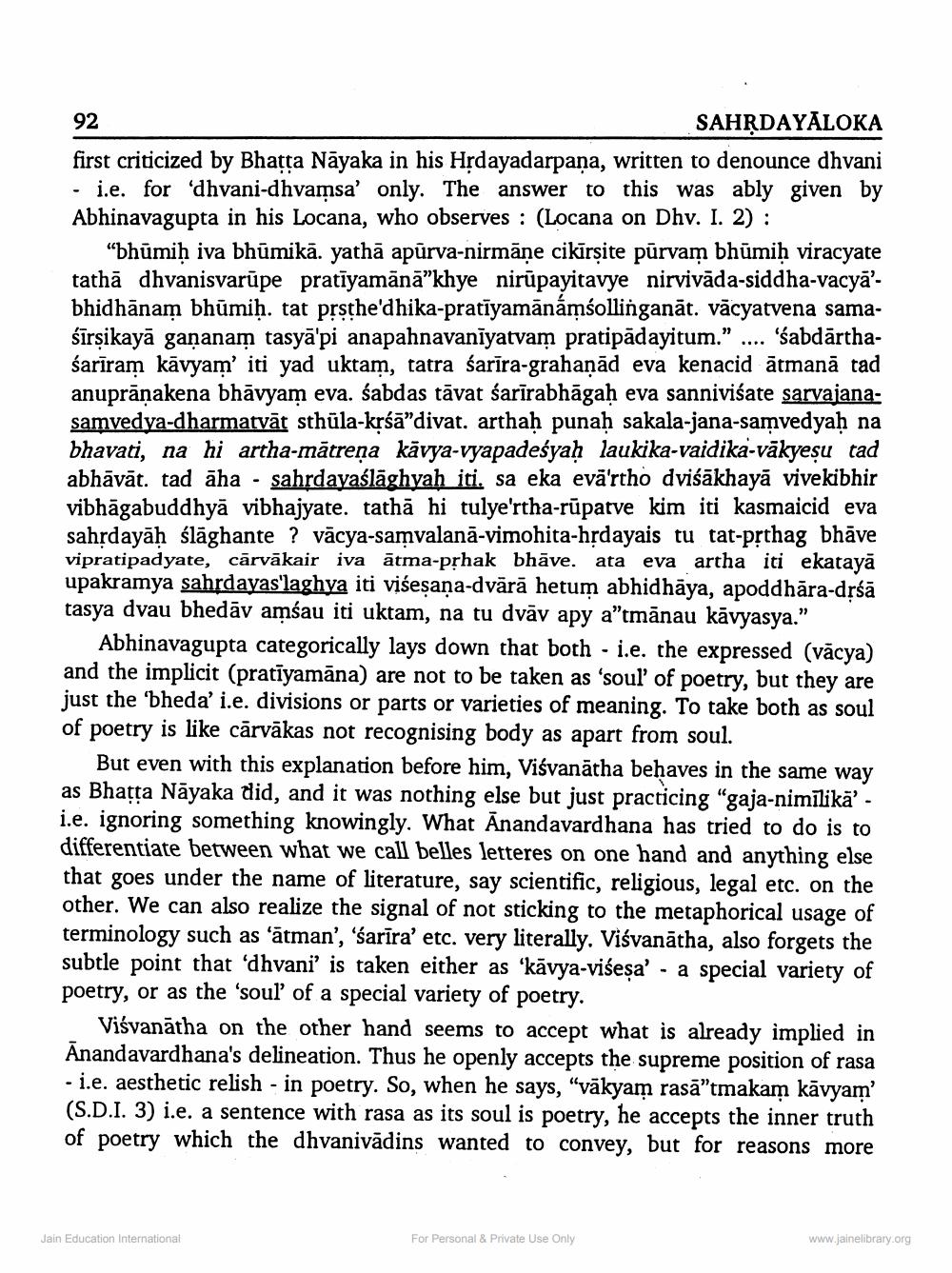________________
92
SAHRDAYĀLOKA first criticized by Bhatta Nayaka in his Hşdayadarpaņa, written to denounce dhvani • i.e. for 'dhvani-dhvamsa' only. The answer to this was ably given by Abhinavagupta in his Locana, who observes : (Locana on Dhv. I. 2) :
"bhūmiḥ iva bhūmikā. yathā apūrva-nirmāne cikīrșite pūrvam bhūmih viracyate tathā dhvanisvarūpe pratīyamānā”khye nirūpayitavye nirvivāda-siddha-vacyā’bhidhānam bhūmiḥ. tat prsthe'dhika-pratīyamānāņšollinganāt. vācyatvena samaśīrşikayā gananam tasyā'pi anapahnavanīyatvam pratipādayitum." .... 'śabdārthaśarīram kāvyam' iti yad uktam, tatra śarīra-grahaņād eva kenacid ātmanā tad anuprāņakena bhāvyam eva. sabdas tāvat śarīrabhāgah eva sannivićate sarvajanasamvedya-dharmatyāt sthūla-krśā”divat. arthah punah sakala-jana-samvedyah na bhavati, na hi artha-mātrena kavya-vyapadeśyah laukika-vaidika-vākyeșu tad abhāvāt. tad āha - sahrdavašlāghvah iti. sa eka evā'rtho dviśākhayā vivekibhir vibhāgabuddhyā vibhajyate. tathā hi tulye'rtha-rūparve kim iti kasmaicid eva sahrdayāh slāghante ? vācya-samvalanā-vimohita-hrdayais tu tat-prthag bhāve vipratipadyate, cārvākair iva ātma-prhak bhāve. ata eva artha iti ekatayā upakramya sahrdayas'laghya iti višesana-dvārā hetum abhidhāya, apoddhāra-dršā tasya dvau bhedāv amśau iti uktam, na tu dvāv apy a"tmānau kāvyasya.”
Abhinavagupta categorically lays down that both - i.e. the expressed (vācya) and the implicit (pratiyamāna) are not to be taken as 'soul of poetry, but they are just the 'bheda' i.e. divisions or parts or varieties of meaning. To take both as soul of poetry is like cārvākas not recognising body as apart from soul.
But even with this explanation before him, Viśvanātha behaves in the same way as Bhatta Näyaka did, and it was nothing else but just practicing "gaja-nimīlikä' - i.e. ignoring something knowingly. What Anandavardhana has tried to do is to differentiate between what we call belles letteres on one hand and anything else that goes under the name of literature, say scientific, religious, legal etc. on the other. We can also realize the signal of not sticking to the metaphorical usage of terminology such as ātman', 'śarīra' etc. very literally. Viśvanātha, also forgets the subtle point that 'dhvani' is taken either as 'kāvya-visesa' - a special variety of poetry, or as the 'soul of a special variety of poetry.
Viśvanātha on the other hand seems to accept what is already implied in Anandavardhana's delineation. Thus he openly accepts the supreme position of rasa - i.e. aesthetic relish - in poetry. So, when he says, "vākyam rasā"tmakam kāvyam' (S.D.I. 3) i.e. a sentence with rasa as its soul is poetry, he accepts the inner truth of poetry which the dhvanivādins wanted to convey, but for reasons more
Jain Education International
For Personal & Private Use Only
www.jainelibrary.org




